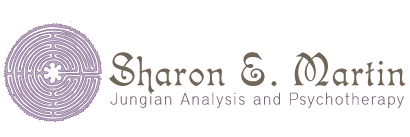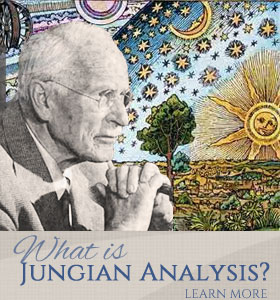What is Jungian Analysis?
Jungian Analysis is a psychoanalytic process developed by Carl Gustav Jung, a Swiss psychiatrist, one of the pioneers of modern depth psychology or psychology of the unconscious. The unconscious is that part of the psyche over which the ego (or the will) has no control. This is easily seen in habits we cannot break such as addictions, or in autonomous emotional states which “come over us” (also known as complexes), causing us to behave in ways we often regret. We often refer to such symptoms as neuroses. Jung believed that in order to become a whole person, these two aspects of the psyche, ego consciousness and the unconscious, must come together into a harmonious relationship. This is a process he called “individuation,” or becoming who you really are.
One of the most distinguishing characteristics of Jungian viewpoint is that it sees great value in these symptoms or neuroses. Jung saw symptoms or neuroses as profoundly important and purposeful, giving us information about what is happening in the unconscious, which he saw as infinitely more powerful than consciousness. These symptoms are messages from our soul, and by entering into them and paying them appropriate attention, we begin to see what is out of balance in the psyche and how we can consciously become more balanced and whole.
In many cases we have to say, “Thank heaven he could make up his mind to be neurotic.” Neurosis is really an attempt at self-cure. . . . It is an attempt of the self-regulating psychic system to restore the balance, in no way different from the function of dreams-only rather more forceful and drastic.[The Tavistock Lectures,” CW 18, par. 389.]
I myself have known more than one person who owed his entire usefulness and reason for existence to a neurosis, which prevented all the worst follies in his life and forced him to a mode of living that developed his valuable potentialities. These might have been stifled had not the neurosis, with iron grip, held him to the place where he belonged. [“The Problem of the Attitude-Type,” CW 7, par. 68.]
Therefore Jungian analysis is not content with the alleviation or eradication of symptoms, as seriously as it takes that task. It also seeks to hear the message of the neurosis, which usually points to a deeper matter that needs one’s attention, such as complex that has become so powerful as to take over the entire personality, leaving little room for real choices and freedom. It might point to a lack of spiritual orientation, or a failure to develop one’s creative potential.
Dreams also arise from the unconscious, speaking a symbolic language that is initially obscure because our language in waking life is more concrete. However, we each have an innate knowledge of symbolic language and can gradually remember it.
Jungian analysis is essentially a dialogue between two people, the analyst and the analysand. Its aim is to help the analysand get in touch with his/her own inner sources of healing and growth, and thus to arrive at individual answers and solutions. Because Jungian analysis is adapted to the needs and goals of the individual, it may in practice be any number of things: short-term counseling on a specific problem; sympathetic support through a difficult period; help in resolving conflicts and eliminating symptoms; guidance in developing creative potentials or discovering new life possibilities.
Although Jung’s “analytical psychology” has its own distinctive viewpoint, it is, in the final analysis, less a school of psychology alongside others than a fundamental perspective and methodology capable of accommodating a many-sided truth, and thus of integrating the empirical findings of many disciplines, giving them in the process a richer context and new dimensions.
The basic outlook of Jungian psychology makes it possible to offer help in these areas, not in the form of any specific ideology or method, but by assisting the individual to discover the meaning already lying in his/her own soul. Anything he has not acquired himself he will not believe in the long run, and what he takes over from authority merely keeps him infantile. He should rather be put in a position to take his own life in hand. The art of analysis lies in following the patient on all his erring ways and so gathering his strayed sheep together.[Some Crucial Points in Psychoanalysis,” CW 4, par. 643
The spirit of Jungian analysis and therapy is perhaps best captured in Jung’s own words: “The prime task of psychotherapy today is to pursue with singleness of purpose the goal of individual development. So doing, our efforts will follow nature’s striving to bring life to the fullest possible fruition in each individual . . . The labors of the doctor as well as the quest of the patient are directed towards that hidden and as yet unmanifest ‘whole’ man, who is at once the greater and future man.”
Is Jungian Analysis for you?
The most common reason most people seek analysis or psychotherapy is that they are suffering in some way. They are seeking relief from symptoms which are often brought on by life events which have had a dramatic impact on their sense of self. For others, there is a sense that they are out of touch with themselves or that they have betrayed themselves by taking a certain path or direction. They may feel they have lost their way and are seeking a way to return to their true path. Some feel disenchanted with traditional clinical psychotherapies and medications, and seek an alternative approach to their symptoms and suffering. And some, just want to know more about themselves and the reasons their lives have turned out the way they have. They want to engage in what Jung called the “special act of reflection.”
Some reasons Jungian analysis may be right for you:
- Feelings of meaninglessness
- Desire for increased self-knowledge and awareness
- Desire to connect to your deeper essence and truth
- Creativity blocks
- Relationship issues
- Issues related to sexual orientation
- Work-related problems
- Mid-life Crisis
- Addictions
- Trauma
- Grief and/or loss
- Chronic pain or illness
- Depression
- Anxiety
- Spiritual crisis
What is a Certified Jungian Analyst?
Certification as a Jungian analyst requires completion of an extensive and thorough post-graduate training program at an institute approved by the International Association for Analytical Psychology. Requirements for admission to such a training program include a graduate degree, supervised experience in a therapeutic field, and personal Jungian analysis, which continues throughout the training and lays its foundation. Jung believed that all analysts must of necessity undergo their own rigorous and sustained personal analysis. The analysts’ training generally extends over a four to eight year period. Training and certification are designed to ensure a high level of competence, quality and integrity among Jungian analysts.
What can I expect if I decide to meet with a Jungian analyst for a consultation?
Generally analysts meet with prospective patients for one or two sessions to determine whether the therapeutic relationship feels promising for productive work. Often a patient’s dream can be helpful in reaching this decision. If both parties agree that the relationship appears to be satisfactory, they will agree to a regular schedule for sessions.
“The dream is a little hidden door in the innermost and most secret recesses of the soul.”
– C.G. Jung





